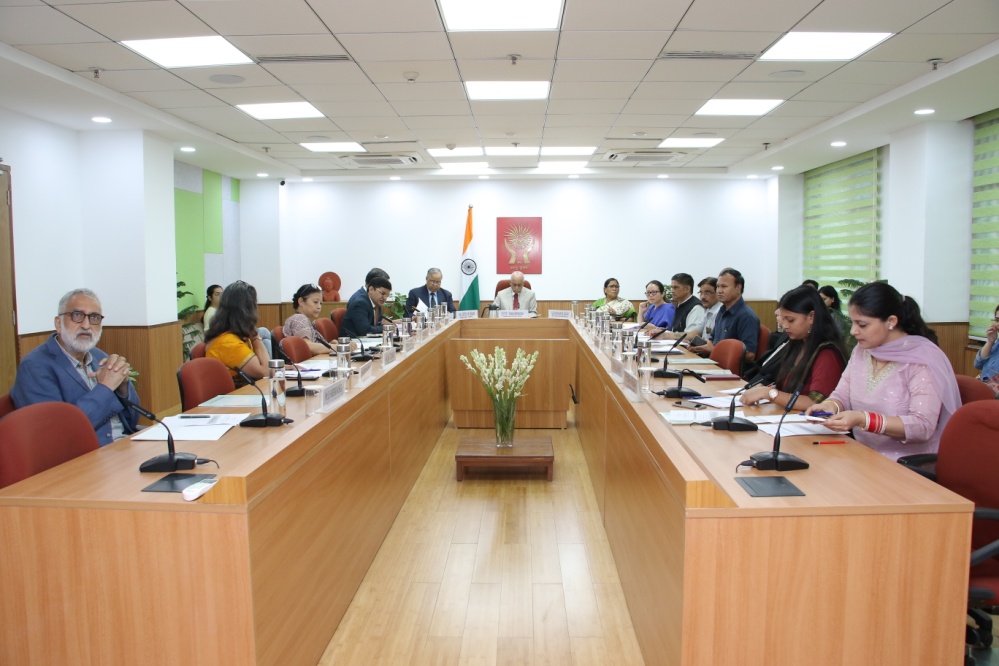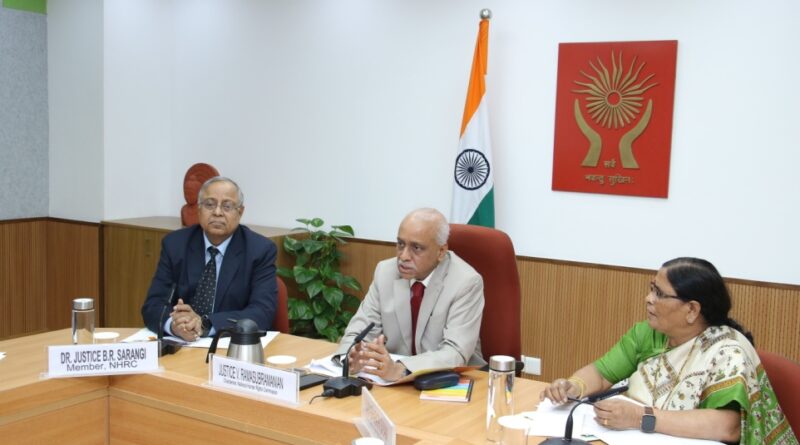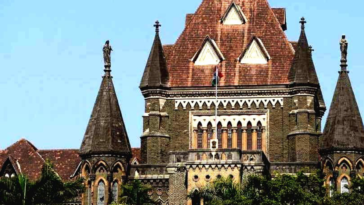NHRC Chairperson Justice Ramasubramanian Urges Crackdown on Ragging: Enforcement Must Match Law
(Syed Ali Taher Abedi)
New Delhi, August 28 — The National Human Rights Commission (NHRC) convened an Open House Discussion on “Re-examining Ragging in Higher Educational Institutions: Creating Safer Campuses through Awareness, Accountability and Action” at Manav Adhikar Bhawan, New Delhi.
The session was chaired by Justice V. Ramasubramanian, Chairperson of the NHRC, and brought together a wide spectrum of stakeholders committed to improving campus safety. The meeting was attended by NHRC Members Justice (Dr.) Bidyut Ranjan Sarangi and Smt. Vijaya Bharathi Sayani, along with Shri Bharat Lal, Secretary General of the Commission.
Senior officials including Joint Secretaries Shri Samir Kumar and Smt. Saidingpuii Chhakchhuak, as well as other NHRC personnel, participated in the deliberations. The event also saw the presence of eminent domain experts, heads of reputed higher educational institutions, academic leaders, legal professionals, and civil society representatives, all contributing to a robust dialogue on the persistent issue of ragging and the need for stronger enforcement mechanisms.
The discussion focused on identifying systemic gaps in the implementation of anti-ragging laws and exploring collaborative strategies to foster safer, more inclusive learning environments across India’s campuses.
The discussion revolved around three key areas:
i.) Understanding the challenges and impact of ragging in Indian campuses
ii.) Reviewing the existing legal and institutional anti-ragging frameworks and
iii.) Exploring ways to strengthen prevention through awareness, action and inclusion.
NHRC Chairperson Justice V. Ramasubramanian, while chairing the discussion, voiced concern over the persistence of ragging in higher education. He observed that despite multiple laws, committees, and UGC regulations, effective enforcement remains the real challenge.
He called for stronger monitoring mechanisms to stop ragging in its various manifestations. He emphasised the need to enforce statutes, greater sensitivity in handling complaints and strict anonymity for complainants to ensure victims’ protection and justice.
Before this, in his opening remarks, Shri Bharat Lal, Secretary General, NHRC, said that ragging damages self-respect, dignity and in some cases, the whole career of a student. He drew attention to data highlighting medical institutions as hotspots for ragging, accounting for 38.6% of incidents despite having only 1.1% of the total student population in the country. He recalled the constitution of the R. K. Raghavan Committee and reiterated the three fundamental principles of Prevention, Prohibition and Punishment as the framework to combat this menace. Stressing the pivotal role of the NHRC, he urged that the discussion must lead to meaningful outcomes and concrete actions.

Dr. Justice Bidyut Ranjan Sarangi, Member, NHRC, stressed the need to identify the root causes and urged participants to recommend practical preventive measures to control this scourge. Vijaya Bharathi Sayani, Member, NHRC, further highlighted the prevalence of caste-based ragging in certain parts of the country and emphasised the need for inclusive, targeted interventions.
At the outset, while welcoming the participants, Samir Kumar, Joint Secretary, NHRC, outlined the agenda aimed at collectively charting a path forward to ensure that higher education institutions remain spaces of growth, creativity and equal opportunity.
The Open House Discussion was attended by Smt. Rina Sonowal Kouli, Joint Secretary (Higher Education), Ministry of Education; Prof. Manish R. Joshi Secretary, University Grants Commission (UGC); N.H SiddalingaSwamy, AICTE; Prof. Manas K. Mandal, Professor of Psychology, Indian Institute of Technology (IIT) Kharagpur; Bharat Parashar, Member Secretary, National Legal Services Authority (NALSA); Dr. Rakesh Lodha Associate Dean, All India Institute of Medical Sciences (AIIMS), New Delhi; Dr. Gururaj Gopinath Pamidi, Chief Administrative Officer, IIM, Indore; Dr. Arvind Kumar Drave, Consultant, National Medical Commission (NMC), New Delhi; Prof. Sampa Saha, Indian Institute of Technology, Delhi; Prof. Royana Singh, Banaras Hindu University; Prof. Rajendar Kachroo, Founder, Aman Movement; Alka Tomar, Chairperson, Centre for Youth; Dr. Meet Ghonia, National Secretary, The Federation of Resident Doctors Association (FORDA); Gaurav Singhal, Vice President and Smt. Meera Kaura Patel, Legal head, Society Against Violence in Education (SAVE), among others.
With the active participation of all the stakeholders in the discussions, the following key suggestions emerged:
– The decision architecture needs to be changed by emphasising the ‘nudge technique’ by Richard Thaler to subliminally change people’s mindset for preventing ragging.
– Display of the UGC’s 24×7 anti-ragging helpline on every institution’s website.
– Immediate Mandatory reporting to police.
– Encourage anonymous complaints of ragging.
– Representation of SC/ ST /OBC/ Minorities in anti-ragging committees.
– Ensuring victim safety and protection post-reporting.
– Regular audits, surprise checks, CCTV surveillance and police visits to campuses.
– Establishing Wellness and Inclusion Centres with trained mental health professionals.
– No closure of complaints without the approval of the district administration.
– Annual anti-ragging reports from institutions with evidence and accountability measures.
– Recognition of ragging-free campuses as a best practice.
– Parental involvement in complaint cases.
– Collaboration between NHRC, NALSA and UGC.




